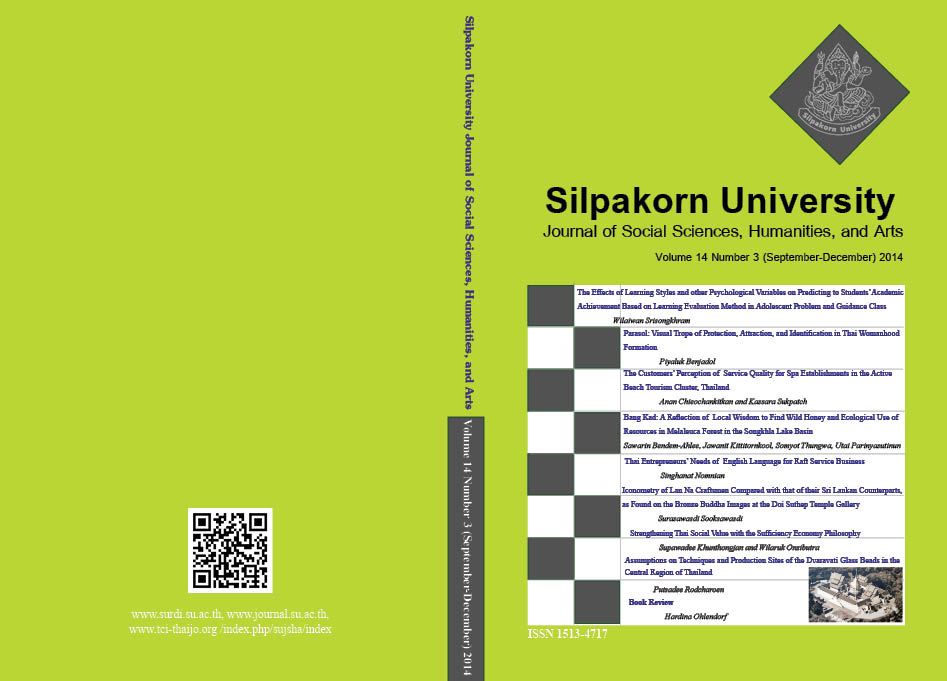Strengthening Thai Social Value with the Sufficiency Economy Philosophy
Main Article Content
Abstract
It is the empirical truth that Thai social value has been changed since the emergence of technology advancement. This study aims to (1) evaluate the level of sufficiency economy practice of the populace in urban and rural communities (2) compare the practical use of sufficiency economy between urban society and rural community and (3) to investigate opinions the cultivation of sufficiency economy-based social values. The three cities considered in the study were Ubon Ratchathani, Si Sa Ket, and Surin. 350 people living in both urban and rural communities in those cities were the population analyzed in the 12 month study. The tools employed were questionnaires and interviews that were analyzed through descriptive statistics: mean, standard deviation, and t-Test. The study reveals that (1) the practical use of sufficiency economy in the aspects of the three core elements and two special conditions were as follows: doing the right job (x̄ = 4.41); maintaining Thai being (x̄ = 4.29); effort into useful things (x̄ = 3.99);opening mind to globalization with careful consideration; (x̄ = 3.88), and being honest (x̄ = 4.37) (2) The practical use of sufficiency economy between urban society and rural community was compared, regarding the hypothesis stated that an application of SE between urban society and rural community is not different, and the sub hypothesis that an application of sufficiency economy between urban society and rural community is different. The finding revealed that the SE on the aspects of moderation and moral integrity are statistically different at 0.05 resulting rejection of main hypothesis and accepting sub hypothesis and (3) the most important factor of cultivating social value that based on sufficiency economy is being a role model.
Downloads
Article Details
All rights reserved. Apart from citations for the purposes of research, private study, or criticism and review,no part of this publication may be reproduced, stored or transmitted in any other form without prior written permission by the publisher.
References
Chanchai, M. (2008) Influences of Globalization toward Economics Politics and Society in Thailand. Bangkok: Strategic Studies Center Publishing.
Chapilamun, S (2009) Attitudes toward Morality Customs and Culture of Thai Parents for Nurturing: Case Study: Bangkok Zone. Research Paper. Mahidol University.
Charoenwongsak, K. (2003) Future Trends and Required Thai Characteristics. Research Paper. Bureau of Academic Affairs and Educational Standards. Office of the Nation Education.
Danthamrongkul, W. (2003) Management, 1st ed., Bangkok: Third Wave Education Ltd Publishing.
Institute for the Promotion and Development of Learning Innovation. (2013) Thai’s way of life. [Online URL: https://dnfe5.nfe.go.th/dnfe5_v2/frontend/theme/index.php] accessed on December 17, 2013.
Kittiampol, A. (2011) Sufficiency Economy and Globalization. Speech on Special Occasion 13 February 2011.
Nanbaru, Y. (2012) New Ways. Online URL: https://www.yalannanbaru.com/index.php accessed on September 20, 2012.
Office of National Economic and Social Development Board. (2011) The 11th National Economic and Social Development Plan (2555-2559 B.E.). Online URL: https://www.nesdb.go.th/Default.aspx?tabid=85 accessed on July 8, 2011.
Office Statistics Thailand. (2012) Population [Online URL: https://service.nso.go.th/nso/nsopublish/service/servstat.html] accessed on December 14, 2013.
Samitrasiri, S. and Kongpanya, P. (2001) Happiness and Community: A Small Attempt at Phutthamonthon Urbanity and Rurality.Bangkok: Pap Publishing.
Sheila, L. Croucher. (2004) Globalization and Belonging: The Politics of Identity in a Changing World. Lanham, Maryland: Rowman & Littlefield. p.10.
Silanukit, C. (2007) The Study of Morality of Junior High School Students: The Demonstration School of Ramkhamhaeng University.Ramkhamhaeng University Journal 10(1).
Sisaad, B. (1998) Statistic Methodology for Research, 2nd ed., Bangkok: Suviriya Publishing.
Tana Sa-Nguanwong, J. (2012) Thai Society. Online URL: https://e-learning.etech.ac.th/learninghtml/s1301/unit02.html#u02, accessed on September 23, 2012.
Thai Fund Foundation. (2009) ESAN’s Way Out and Responsibility of Local Administrative Office: Amidst Globalization Crisis. Online URL: https://www.konthairakkan.com/2009-08-24-20-13-10/2010-04-08-07-21-05.html accessed on December 15, 2013.
Waiwanitchkul, N. (2002) Research Methodology, 4th ed., Bangkok: Chulalongkorn University Publishing.
Wongrattana, C. (2001) Techniques for Research Statistic, 8th ed., Bangkok: Naramit Publishing.
Yamane, T. (1973) Statistics: An Introductory Analysis, 3rd ed., New York : Harper and Row Publication.
Yutthayong, S. et al., (2011) Factors Relevant to Values of Boromarajonani College of Nursing, Udon Thani. Research Paper.
Yutthayong, S. et al., Thai Social Structure. (2012) [Online URL: https://www.meemodo.com/THThaistucture.html] accessed on December 14, 2013.


